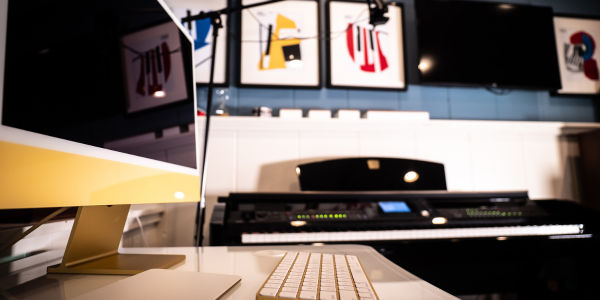We would like to thank Madeleine Crouch for this article about piano study and how it affects academic achievement. To read the full article, click here. Between August 5 and September 15, The Frances Clark Center is offering 20% off all full-length courses such as A Pianist’s Guide to Studio Management. Check out our other courses here and use this discount code to get 20% of your order: BLOG20B2S.

Did someone ever ask you, “How do you know that’s true? Did you read it somewhere … what proof do you have?” And you answered without hesitation, “I don’t know how, I just know it!”
Piano teachers just know that studying music, especially the piano, is good for kids. We believe that piano lessons will help our students in their school lessons. We feel it in our bones that even the most reluctant student will, looking back on years of piano lessons, admit, “Sure I hated to practice, but my piano teacher taught me the self-discipline that made me the success I am today.” (Let’s not forget that an unabashed fan of music lessons now resides at 1600 Pennsylvania Avenue!)
In 1993, the National Piano Foundation funded a study, Teachers’, Parents’ and Students’ Perceptions of the Role of Piano Instruction in Students’ Lives. Administering the project was Robert Duke of the University of Texas at Austin.
Approximately one hundred piano pedagogy faculty from across the United States identified individuals in their geographic regions with reputations as excellent piano teachers. 170 of these teachers provided lists of their students, including parents, willing to participate. From the list of 2,642 students Dr. Duke selected a random sample of 951, then classified them to obtain relatively equal numbers of students within ability levels scaled from 1 through 10 and age groups from 4 to 18. The final sample included 124 teachers and 663 students and their parents from thirty states. Each student, teacher, and parent completed extensive questionnaires related to the student’s piano study and life in general. Questions covered attitudes and achievement related to piano and school, participation in extracurricular activities, expectations, and goals. What follows are some of the more interesting results of this research.
Excerpts from the final report of the National Piano Foundation Research Project
Robert A. Duke, director
First, it’s important to realize that the majority of students whose parents can afford private music lessons in piano are students who have numerous life advantages. The students in our sample were, for the most part, the children of well-educated, affluent suburban and urban professionals. The small numbers of minority children and children from lower-income households that we found in our sample serve as a reminder of the many children who could benefit from piano instruction – or other forms of educational enrichment for that matter – but are not being served by this important aspect of music education.
The fact that parents choose piano study as an activity worthy of their time and money, in addition to or instead of dance, sports, etc., supports the notion that parents view music study as an important, life-enhancing experience for their children.
The children in our sample are generally “good kids,” that is, they do well in most endeavors in which they participate. What is interesting about the relationship of piano to other aspects of these children’s lives is that, irrespective of their ability as pianists, nearly all of these children, and their parents and teachers, believe that piano study is worthwhile, enjoyable and capable of producing benefits beyond the acquisition of music skills.
Many parents who studied music privately and participated in school music groups as children continue to participate as adults. Music-making becomes something of a “family tradition,” and perhaps it is not surprising that these parents choose to provide their children with educational opportunities similar to those they had as children.
We hope you enjoyed this excerpt from Madeleine Crouch’s article “Does Piano Study Help Children in Other Aspects of School Study?” To read the entire article, click here.
MORE ON STUDIO MANAGEMENT
- COURSE: A Pianist’s Guide to Studio Management
- MAGAZINE ARTICLE: How do you use technology to organize and manage your studio? by George Litterst
- MAGAZINE ARTICLE: Studio policies for your sporadic adult students by Wendy Stevens and Kenneth Christensen
- MAGAZINE ARTICLE: Starting A Studio: What, Where, and How? by Rebecca Grooms Johnson, Monica Allen, and Jessica Mellott
- WEBINAR: Payments and Policies for the Independent Music Teacher with Heather Smith and Beth Gigante Klingenstein
- WEBINAR: Studio Policies for the 21st Century Music Teacher with Heather Smith and Deborah How